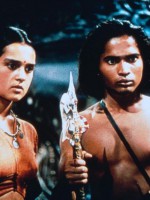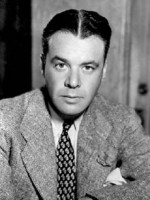John Howard Lawson is a Actor and Scriptwriter American born on 24 september 1894 at New York City (USA)

John Howard Lawson (September 25, 1894 – August 11, 1977) was an American writer. He was for several years head of the Hollywood division of the Communist Party USA. He was also the organization's cultural manager and answered directly to V.J. Jerome, the Party's New York-based cultural chief. He was the first president of the Writers Guild of America, West after the Screen Writers Guild divided into two regional organizations.
Education
After Simeon's wife died, he would take control of the children's education: first to Halstead School in Yonkers, New York and then Cutler School (New York) in New Rochelle, New York. In 1906, Simeon sent the three children on a tour of Europe, and seeing theatre was on the list. John Howard would take notes on the set designs, actors, and plays. In 1909, they were sent on a tour of America and Canada.
At age seven, he attended Elizabeth and Alexis Ferms' "Children's Playhouse" school, an experimental school for children.
After studying at Williams College (1910–1914) and graduating with a B.A., he became a successful writer with plays such as Standards (1916) and Servant-Master-Lover (1916). While there, his brother was in Germany studying music and art. Works of Karl Kautsky struck him because of his sense of alienation. He was not only a contributor to The Williams College Monthly, but also an editor of the senior-class book and a member of the varsity debating team. He was known to other students as a good-natured iconoclast and a frequent speaker at undergraduate meetings. After graduating, he would become an editor at Reuters from 1914-1915.
Early career
His first piece, A Hindoo Love Drama was written while at Williams. Mary Kirkpatrick, who was the head of the Williams College Drama Club, was impressed by this effort. That confidence inspired him to write three plays in 1915-1916: Standards, The Spice of Life, and Servant-Master-Lover.
Standards was bought by George M. Cohan and Sam Harris and was given a tryout in Albany and Syracuse in 1915. It never made it to Broadway. Oliver Morosco produced Servant-Master-Lover in a run in Los Angeles, but to bad reviews.
World War I
When the United States entered World War I in 1917, he was opposed to joining. His father helped get a position in the Norton-Harjes Volunteer Ambulance Corps. In June 1917, he left for the war and aboard the ship he met John Dos Passos. In November, when Norton-Hayes folded into the American Red Cross's Ambulance Service, Dos Passos and Lawson decided to become drivers and the left for Italy. At this time, Dos Passos was working on One Man's Initiation: 1917 and Lawson on Roger Bloomer. While serving, they were outfitted to Paris where Lawson went to the Comédie-Française and Sergey Diaghilev's ballet troupe. In January 1918, Dos Passos wrote a letter that was critical of the ambulance company, made its way to the Red Cross officials, and he was forced to resign. Lawson was under suspicion, but he managed to stay in Italy and do public-relations work for the Red Cross.
In the spring of 1919, Lawson left Italy for Paris, where he married his first wife, Katharine (Kate) Drain, who was a volunteer nurses aide, and later would be an actress. They would have one child, but divorce by 1923.
Post War
After the war he edited a newspaper in Rome. He then lived in Paris in 1920-1921, which is where he would complete Roger Bloomer. This was Lawson's first show to reach Broadway, which opened on March 1, 1923. It was put on by the Equity Players and ran for fifty performances.
His next show, Processional,opened on Broadway on January 12, 1925 and was put on by the Theatre Guild. It ran for 96 performances. The production, however, failed financially, and the Theatre Guild told Lawson that they would not stage any more expressionistic plays.It was later revived in 1937 for the Federal Theatre Project to critical and popular acclaim.
His love of theatre was heightened when in 1926 the New York International Theatrical Exposition showcased experimental European cubist, futurist, and constructivist plays. After seeing this, Lawson, Dos Passos, and Michael Gold (founder/editor of The New Masses) formed the Workers Drama League to produce revolutionary plays. Only one production and a few weeks later, the three men disbanded. They then joined Em Jo Basshe and Francis Edward Faragoh and formed the New Playwrights Theatre. This lasted until 1929, mostly due to the funding from millionaire Otto Hermann Kahn.
March 3, 1926 was the premiere of Nirvana at the Greenwich Village Theatre, but only ran for six performances. The play calls for a new religion that can help people survive the swirling cyclone of jazz, new machinery, great buildings, science fiction, tabloids, and radio. The play was only put on for that long because of Lawson's reputation after Processional and the incredible set design by Mordecai Gorelik.
In late 1926, along with Dos Passos, Gold, were on the National Executive Committee who attempted to found the Proletarian Artists and Writers League, with backing from a similar Soviet organization. In August 1927, Dos Passos, Gold, and Lawson went to Boston to protest the Sacco and Vanzetti trial. In his diary afterword, Lawson would write that he could "neither ignore the flaws in American politics and economics nor bring himself to become more deeply involved in the struggle".
The first play produced by the New Playwrights Theatre, Loud Speaker opened on March 7, 1927 at the 52nd Street Theatre and ran for forty-two performances. The idea of the play stemmed from the ceremonial laying of the cornerstone at the new Theatre Guild playhouse in 1924, in which Governor Alfred E. Smith and Otto Kahn were both in attendance. Lawson wondered if Kahn would be a more interesting governor than Smith.
Hollywood
While he was in Hollywood, New Playwrights Theatre decided to produce one of his plays, The International, with the set design by John Dos Passos. It opened on January 12, 1928 and ran for twenty-seven performances.
In 1928, Lawson moved to Hollywood where he wrote scripts for films such as The Ship for Shanghai, Bachelor Apartment, and Goodbye Love. In the winter of 1930-1931, it was at this time during the Great Depression that Lawson wrote Success Story. The Theatre Guild rejected the script, but Harold Clurman, a reader for them, had recently just formed the Group Theatre (New York) and needed new scripts. Clurman and Lawson reworked the play during the summer of 1932, and Success Story opened on September 26, 1932 for 121 performances. Lawson would also pen the screenplay based on the play, Success at Any Price in 1934.
In 1933, Lester Cole, Samuel Ornitz, and Lawson helped to organize and become first presidents of the Screen Writers Guild. After he was fired from Metro-Goldwyn-Mayer, he moved to Washington, D.C to have the group established by National Labor Board for purposes of bargaining for screenwriters. While in D.C., The Pure in Heart and Gentlewoman were being produced in New York.
Lawson wrote The Pure in Heart while he was working on Success Story. The Theatre Guild agreed to produce the play, but closed it when the out-of-town tryout in Baltimore failed. After the Group Theatre also rejected the play, it was produced by Richard Aldrich and Alfred De Liagre. The Pure in Heart opened on March 20 and had a run of only seven performances.
Gentlewoman, in association with D. A. Doran Jr, was put up by the Group Theatre and opened on March 22, 1934. It ran for twelve performances.
During the 1930s, leftists accused Lawson of having a lack of ideological and political commitment. New Playwrights Theatre associate Mike Gold attacked him in The New Masses on April 10, 1934, calling him a "A Bourgeois Hamlet of Our Time" who wrote adolescent works that lacked moral fiber or clear ideas. Lawson responded a week later in The New Masses in the article "'Inner Conflict' and Proletarian Art" he cited his middle-class childhood as the reason why he could fully understand the working people. He also recognized that his prosperity and Hollywood connections were suspect in the fight for workers' rights. Due to the criticism, he joined the Communist Party and began a program of educating himself about the proletarian cause. He would soon travel throughout the poverty-stricken South to study bloody labor conflicts in Alabama and Georgia.
While in the South, he would submit articles to the Daily Worker, which got him arrested numerous times. These experiences would inspire his next play, Marching Song. It was put on by the radical Theatre Union and it opened on February 17, 1937 and ran for sixty-one performances.
Lawson, who joined the American Communist Party in 1934, made several films that were political, including Blockade (1938), which starred Henry Fonda. It was a film on the Spanish Civil War for which he received a nomination for the Academy Award for Best Story. Lawson also wrote Counter-Attack (1945), a tribute to the Soviet-USA alliance during the Second World War. He also wrote more innocuous films, such as the critically acclaimed Algiers (1938) and the Humphrey Bogart vehicles Sahara and Action in the North Atlantic in 1943.
The House Un-American Activities Committee (HUAC)
After World War II, the House Committee on Un-American Activities (HUAC) began an investigation into the Hollywood Motion Picture Industry. In September 1947, the HUAC interviewed 41 people who were working in Hollywood. These people attended voluntarily and became known as "friendly witnesses". During their interviews they named several individuals whom they accused of holding left-wing views.
Lawson appeared before the HUAC on October 29, 1947, but like Alvah Bessie, Herbert Biberman, Albert Maltz, Adrian Scott, Dalton Trumbo, Lester Cole, Edward Dmytryk, Samuel Ornitz and Ring Lardner Jr, he refused to answer any questions. Known as the Hollywood Ten, they claimed that the First Amendment of the United States Constitution gave them the right to do this. The HUAC and U.S. appeals courts, however, disagreed and all were found guilty of contempt of Congress and Lawson was sentenced to twelve months in Ashland Prison and fined $1,000. In his 1951 HUAC testimony, Edward Dmytryk testified that Lawson, amongst others, had pressured him to put communist propaganda in his films.
Lawson had organized and led the attack on Albert Maltz when Maltz published an article, "What Shall We Ask of Writers", in The New Masses, challenging the didacticism of the American Communist Party's censorship of writers. Surprised by the ferocity of attack from his fellow writers, including Lawson, Howard Fast, Alvah Bessie, Ring Lardner, Jr., Samuel Sillen, and others, Maltz publicly recanted.
Post Blacklist
Blacklisted by the Hollywood studios, Lawson moved to Mexico where he began writing Marxist interpretations of drama and film-making such as The Hidden Heritage (1950), Film in the Battle of Ideas (1953) and Film: The Creative Process (1964). He also wrote one of the first anti-apartheid movies, Cry, the Beloved Country (1951) under a pseudonym.
After he was blacklisted, he taught at several universities including: Stanford University, Loyola Marymount University, and Los Angeles University of Judaism.
In his book Film in the Battle of Ideas, Lawson asserted that "the rulers of the United States take the film very seriously as an instrument of propaganda" and that the influence of Hollywood movies is utilized to "poison the minds of U.S. working-class people" and that inaccurately describes the reality of U.S. working-class life. Lawson asserted that Hollywood "falsifies the life of American workers" and its "unwritten law decrees that only the middle and upper classes provide themes suitable for film presentation, and that workers appear on the screen only in subordinate or comic roles." According to Lawson, "workers and their families see films which urge them to despise the values by which they live, and to emulate the corrupt values of their enemies" and "the consistent presentation on the nation's screens of the views that working-class life is to be despised and that workers who seek to protect their class interests are stupid, malicious, or even treasonable" is what Hollywood engages in.
Lawson also argued that Hollywood promoted degrading images of women in the first half of the 20th century. According to Lawson, "Hollywood treats 'glamour' and sex appeal as the sum-total of woman's personality" and "portraits of women in Hollywood films fall into three general categories: the woman as a criminal or the instigator of crime; the woman as man's enemy, fighting and losing - for she must always lose - in the battle of the sexes; the woman as a `primitive' child, fulfilling the male dream of a totally submissive vehicle of physical pleasure." Lawson also argued that in most U.S. movies "when a woman succeeds in the world of competition, Hollywood holds that her success is achieved by trickery, deceit, and the amoral use of sexual appeal."
His unpublished autobiography is at Southern Illinois University Carbondale in Carbondale, Illinois.
Source : Wikidata
John Howard Lawson

Nationality USA
Birth 24 september 1894 at New York City (USA)
Death 11 august 1977 (at 82 years) at San Francisco (USA)
Birth 24 september 1894 at New York City (USA)
Death 11 august 1977 (at 82 years) at San Francisco (USA)
Biography
Lawson was born in New York City, New York on September 25, 1894 to Simeon Levy and Belle Hart Lawson. His father would change their name from Levy to Lawson before Johnathon was born, his reason for which was so that his son could "obtain reservations at expensive resort hotels" When he was five, his mother died. She had named her children after people she admired: John Howard Lawson was named after John Howard, his sister Adelaide Jaffery Lawson was named after a friend of hers who was socially active, and Wendell Holmes Lawson was named after Oliver Wendell Holmes, Jr.Education
After Simeon's wife died, he would take control of the children's education: first to Halstead School in Yonkers, New York and then Cutler School (New York) in New Rochelle, New York. In 1906, Simeon sent the three children on a tour of Europe, and seeing theatre was on the list. John Howard would take notes on the set designs, actors, and plays. In 1909, they were sent on a tour of America and Canada.
At age seven, he attended Elizabeth and Alexis Ferms' "Children's Playhouse" school, an experimental school for children.
After studying at Williams College (1910–1914) and graduating with a B.A., he became a successful writer with plays such as Standards (1916) and Servant-Master-Lover (1916). While there, his brother was in Germany studying music and art. Works of Karl Kautsky struck him because of his sense of alienation. He was not only a contributor to The Williams College Monthly, but also an editor of the senior-class book and a member of the varsity debating team. He was known to other students as a good-natured iconoclast and a frequent speaker at undergraduate meetings. After graduating, he would become an editor at Reuters from 1914-1915.
Early career
His first piece, A Hindoo Love Drama was written while at Williams. Mary Kirkpatrick, who was the head of the Williams College Drama Club, was impressed by this effort. That confidence inspired him to write three plays in 1915-1916: Standards, The Spice of Life, and Servant-Master-Lover.
Standards was bought by George M. Cohan and Sam Harris and was given a tryout in Albany and Syracuse in 1915. It never made it to Broadway. Oliver Morosco produced Servant-Master-Lover in a run in Los Angeles, but to bad reviews.
World War I
When the United States entered World War I in 1917, he was opposed to joining. His father helped get a position in the Norton-Harjes Volunteer Ambulance Corps. In June 1917, he left for the war and aboard the ship he met John Dos Passos. In November, when Norton-Hayes folded into the American Red Cross's Ambulance Service, Dos Passos and Lawson decided to become drivers and the left for Italy. At this time, Dos Passos was working on One Man's Initiation: 1917 and Lawson on Roger Bloomer. While serving, they were outfitted to Paris where Lawson went to the Comédie-Française and Sergey Diaghilev's ballet troupe. In January 1918, Dos Passos wrote a letter that was critical of the ambulance company, made its way to the Red Cross officials, and he was forced to resign. Lawson was under suspicion, but he managed to stay in Italy and do public-relations work for the Red Cross.
In the spring of 1919, Lawson left Italy for Paris, where he married his first wife, Katharine (Kate) Drain, who was a volunteer nurses aide, and later would be an actress. They would have one child, but divorce by 1923.
Post War
After the war he edited a newspaper in Rome. He then lived in Paris in 1920-1921, which is where he would complete Roger Bloomer. This was Lawson's first show to reach Broadway, which opened on March 1, 1923. It was put on by the Equity Players and ran for fifty performances.
His next show, Processional,opened on Broadway on January 12, 1925 and was put on by the Theatre Guild. It ran for 96 performances. The production, however, failed financially, and the Theatre Guild told Lawson that they would not stage any more expressionistic plays.It was later revived in 1937 for the Federal Theatre Project to critical and popular acclaim.
His love of theatre was heightened when in 1926 the New York International Theatrical Exposition showcased experimental European cubist, futurist, and constructivist plays. After seeing this, Lawson, Dos Passos, and Michael Gold (founder/editor of The New Masses) formed the Workers Drama League to produce revolutionary plays. Only one production and a few weeks later, the three men disbanded. They then joined Em Jo Basshe and Francis Edward Faragoh and formed the New Playwrights Theatre. This lasted until 1929, mostly due to the funding from millionaire Otto Hermann Kahn.
March 3, 1926 was the premiere of Nirvana at the Greenwich Village Theatre, but only ran for six performances. The play calls for a new religion that can help people survive the swirling cyclone of jazz, new machinery, great buildings, science fiction, tabloids, and radio. The play was only put on for that long because of Lawson's reputation after Processional and the incredible set design by Mordecai Gorelik.
In late 1926, along with Dos Passos, Gold, were on the National Executive Committee who attempted to found the Proletarian Artists and Writers League, with backing from a similar Soviet organization. In August 1927, Dos Passos, Gold, and Lawson went to Boston to protest the Sacco and Vanzetti trial. In his diary afterword, Lawson would write that he could "neither ignore the flaws in American politics and economics nor bring himself to become more deeply involved in the struggle".
The first play produced by the New Playwrights Theatre, Loud Speaker opened on March 7, 1927 at the 52nd Street Theatre and ran for forty-two performances. The idea of the play stemmed from the ceremonial laying of the cornerstone at the new Theatre Guild playhouse in 1924, in which Governor Alfred E. Smith and Otto Kahn were both in attendance. Lawson wondered if Kahn would be a more interesting governor than Smith.
Hollywood
While he was in Hollywood, New Playwrights Theatre decided to produce one of his plays, The International, with the set design by John Dos Passos. It opened on January 12, 1928 and ran for twenty-seven performances.
In 1928, Lawson moved to Hollywood where he wrote scripts for films such as The Ship for Shanghai, Bachelor Apartment, and Goodbye Love. In the winter of 1930-1931, it was at this time during the Great Depression that Lawson wrote Success Story. The Theatre Guild rejected the script, but Harold Clurman, a reader for them, had recently just formed the Group Theatre (New York) and needed new scripts. Clurman and Lawson reworked the play during the summer of 1932, and Success Story opened on September 26, 1932 for 121 performances. Lawson would also pen the screenplay based on the play, Success at Any Price in 1934.
In 1933, Lester Cole, Samuel Ornitz, and Lawson helped to organize and become first presidents of the Screen Writers Guild. After he was fired from Metro-Goldwyn-Mayer, he moved to Washington, D.C to have the group established by National Labor Board for purposes of bargaining for screenwriters. While in D.C., The Pure in Heart and Gentlewoman were being produced in New York.
Lawson wrote The Pure in Heart while he was working on Success Story. The Theatre Guild agreed to produce the play, but closed it when the out-of-town tryout in Baltimore failed. After the Group Theatre also rejected the play, it was produced by Richard Aldrich and Alfred De Liagre. The Pure in Heart opened on March 20 and had a run of only seven performances.
Gentlewoman, in association with D. A. Doran Jr, was put up by the Group Theatre and opened on March 22, 1934. It ran for twelve performances.
During the 1930s, leftists accused Lawson of having a lack of ideological and political commitment. New Playwrights Theatre associate Mike Gold attacked him in The New Masses on April 10, 1934, calling him a "A Bourgeois Hamlet of Our Time" who wrote adolescent works that lacked moral fiber or clear ideas. Lawson responded a week later in The New Masses in the article "'Inner Conflict' and Proletarian Art" he cited his middle-class childhood as the reason why he could fully understand the working people. He also recognized that his prosperity and Hollywood connections were suspect in the fight for workers' rights. Due to the criticism, he joined the Communist Party and began a program of educating himself about the proletarian cause. He would soon travel throughout the poverty-stricken South to study bloody labor conflicts in Alabama and Georgia.
While in the South, he would submit articles to the Daily Worker, which got him arrested numerous times. These experiences would inspire his next play, Marching Song. It was put on by the radical Theatre Union and it opened on February 17, 1937 and ran for sixty-one performances.
Lawson, who joined the American Communist Party in 1934, made several films that were political, including Blockade (1938), which starred Henry Fonda. It was a film on the Spanish Civil War for which he received a nomination for the Academy Award for Best Story. Lawson also wrote Counter-Attack (1945), a tribute to the Soviet-USA alliance during the Second World War. He also wrote more innocuous films, such as the critically acclaimed Algiers (1938) and the Humphrey Bogart vehicles Sahara and Action in the North Atlantic in 1943.
The House Un-American Activities Committee (HUAC)
After World War II, the House Committee on Un-American Activities (HUAC) began an investigation into the Hollywood Motion Picture Industry. In September 1947, the HUAC interviewed 41 people who were working in Hollywood. These people attended voluntarily and became known as "friendly witnesses". During their interviews they named several individuals whom they accused of holding left-wing views.
Lawson appeared before the HUAC on October 29, 1947, but like Alvah Bessie, Herbert Biberman, Albert Maltz, Adrian Scott, Dalton Trumbo, Lester Cole, Edward Dmytryk, Samuel Ornitz and Ring Lardner Jr, he refused to answer any questions. Known as the Hollywood Ten, they claimed that the First Amendment of the United States Constitution gave them the right to do this. The HUAC and U.S. appeals courts, however, disagreed and all were found guilty of contempt of Congress and Lawson was sentenced to twelve months in Ashland Prison and fined $1,000. In his 1951 HUAC testimony, Edward Dmytryk testified that Lawson, amongst others, had pressured him to put communist propaganda in his films.
Lawson had organized and led the attack on Albert Maltz when Maltz published an article, "What Shall We Ask of Writers", in The New Masses, challenging the didacticism of the American Communist Party's censorship of writers. Surprised by the ferocity of attack from his fellow writers, including Lawson, Howard Fast, Alvah Bessie, Ring Lardner, Jr., Samuel Sillen, and others, Maltz publicly recanted.
Post Blacklist
Blacklisted by the Hollywood studios, Lawson moved to Mexico where he began writing Marxist interpretations of drama and film-making such as The Hidden Heritage (1950), Film in the Battle of Ideas (1953) and Film: The Creative Process (1964). He also wrote one of the first anti-apartheid movies, Cry, the Beloved Country (1951) under a pseudonym.
After he was blacklisted, he taught at several universities including: Stanford University, Loyola Marymount University, and Los Angeles University of Judaism.
In his book Film in the Battle of Ideas, Lawson asserted that "the rulers of the United States take the film very seriously as an instrument of propaganda" and that the influence of Hollywood movies is utilized to "poison the minds of U.S. working-class people" and that inaccurately describes the reality of U.S. working-class life. Lawson asserted that Hollywood "falsifies the life of American workers" and its "unwritten law decrees that only the middle and upper classes provide themes suitable for film presentation, and that workers appear on the screen only in subordinate or comic roles." According to Lawson, "workers and their families see films which urge them to despise the values by which they live, and to emulate the corrupt values of their enemies" and "the consistent presentation on the nation's screens of the views that working-class life is to be despised and that workers who seek to protect their class interests are stupid, malicious, or even treasonable" is what Hollywood engages in.
Lawson also argued that Hollywood promoted degrading images of women in the first half of the 20th century. According to Lawson, "Hollywood treats 'glamour' and sex appeal as the sum-total of woman's personality" and "portraits of women in Hollywood films fall into three general categories: the woman as a criminal or the instigator of crime; the woman as man's enemy, fighting and losing - for she must always lose - in the battle of the sexes; the woman as a `primitive' child, fulfilling the male dream of a totally submissive vehicle of physical pleasure." Lawson also argued that in most U.S. movies "when a woman succeeds in the world of competition, Hollywood holds that her success is achieved by trickery, deceit, and the amoral use of sexual appeal."
His unpublished autobiography is at Southern Illinois University Carbondale in Carbondale, Illinois.
Usually with
Filmography of John Howard Lawson (23 films)
Actor
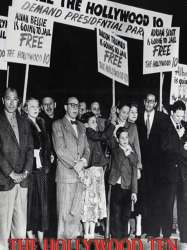
The Hollywood Ten (1950)
, 15minutesDirected by John Berry
Origin USA
Genres Documentary
Themes Documentary films about historical events, Documentary films about politics, Political films
Actors Alvah Bessie, Herbert J. Biberman, Dalton Trumbo, Lester Cole, Edward Dmytryk, Albert Maltz
Roles Self
Rating71%





Scriptwriter
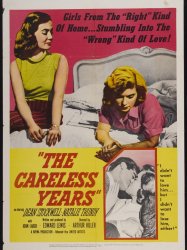
The Careless Years (1957)
, 1h10Directed by Arthur Hiller, John E. Burch
Origin USA
Genres Drama, Romance
Actors Dean Stockwell, Natalie Trundy, John Larch, Barbara Billingsley, John Stephenson, Virginia Christine
Rating56%





Two high school seniors from different social groups go on a date. He begins to fall for her when she resists his amorous advances and decides they should get married immediately. Both sets of parents object to the sudden nature of the proposal. He talks her into going to Mexico to get married, but they finally decide it is best to wait until they are older.

Cry, the Beloved Country (1951)
, 1h43Directed by Zoltan Korda
Origin United-kingdom
Genres Drama
Themes Films set in Africa, Films about racism
Actors Canada Lee, Sidney Poitier, Charles Carson, Geoffrey Keen, Joyce Carey, Michael Goodliffe
Roles Writer
Rating68%





In the back country of South Africa, black minister Stephen Kumalo (Canada Lee) journeys to the city to search for his missing son Absolom, only to find his people living in squalor and Absolom a criminal after committing murder. Kumalo's friend and fellow minister, Reverend Misimangu (Sidney Poitier) is a young South African clergyman who helps find Kumalo's sons and sister-turned-prostitute in the slums of Johannesburg. Both work together to confront the harsh reality of apartheid and what it is doing to both white and black South Africans.
 , 1h43
, 1h43Directed by Stuart Heisler
Origin USA
Genres Drama
Themes Films about alcoholism, Medical-themed films, Films about music and musicians, Films about drugs
Actors Susan Hayward, Eddie Albert, Lee Bowman, Marsha Hunt, Carl Esmond, Carleton Young
Rating62%





In a hospital, Angie Evans (Susan Hayward), her face bandaged, recounts the events that brought her here.

Counter-Attack (1945)
, 1h30Directed by Zoltan Korda
Origin USA
Genres Drama, War
Themes Political films, Films based on plays
Actors Paul Muni, Marguerite Chapman, Larry Parks, Roman Bohnen, George Macready, Ludwig Donath
Rating66%





In 1942, both Nazi Germany and the Soviet Union are gathering forces and supplies in one particular sector of the Eastern Front for a major attack. The Soviets are secretly constructing a bridge at night over a river. To avoid detection, it is being built underwater, just below the surface.

Action in the North Atlantic (1943)
, 2h6Directed by Raoul Walsh, Lloyd Bacon, Byron Haskin
Origin USA
Genres Drama, War, Action, Adventure
Themes Seafaring films, Transport films, La bataille de l'Atlantique, Political films
Actors Humphrey Bogart, Raymond Massey, Alan Hale, Julie Bishop, Ruth Gordon, Sam Levene
Rating69%





An American oil tanker mastered by Capt. Steve Jarvis (Raymond Massey) is sunk in the north Atlantic Ocean by a German U-boat. He and the first officer, his friend Joe Rossi (Humphrey Bogart), make it to a lifeboat along with other crewmen. When the U-boat crew starts filming their plight they respond with rude gestures and are rammed. The men swim to a raft and are rescued after 11 days adrift.

Sahara (1943)
, 1h37Directed by Zoltan Korda
Origin USA
Genres Drama, War, Action, Adventure
Themes Films set in Africa, Political films, Le désert, Guerre du désert
Actors Humphrey Bogart, Bruce Bennett, Frederick Worlock, Lloyd Bridges, J. Carrol Naish, Dan Duryea
Rating74%





The crew of an M3 Lee tank, attached to the British Eighth Army, commanded by U.S. Army Master Sergeant Joe Gunn (Humphrey Bogart), and nicknamed Lulu Belle, become separated from their unit during a general retreat from German forces after the fall of Tobruk. Heading south across the Libyan desert to rejoin their command, they come across a bombed-out field hospital, where they pick up a motley collection of stragglers, among them British doctor Captain Halliday (Richard Nugent), four Commonwealth soldiers, and Free French Corporal Leroux (Louis Mercier). Halliday, the only officer, cedes command to Gunn.
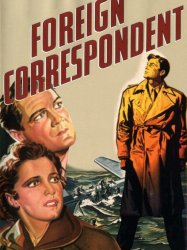
Foreign Correspondent (1940)
, 1h59Directed by Alfred Hitchcock
Origin USA
Genres War, Thriller, Comedy, Action, Spy, Romance
Themes Films about writers, Spy films, Films about journalists, Political films
Actors Joel McCrea, Laraine Day, Herbert Marshall, George Sanders, Albert Bassermann, Robert Benchley
Rating73%





The editor of the New York Globe, Mr. Powers (Harry Davenport), is concerned about the "crisis" in Europe, the growing power of Adolf Hitler and Nazi Germany, and the inability of celebrated foreign correspondents to get answers about whether or not war will ensue. After searching for a good, tough crime reporter for a fresh viewpoint, he appoints Johnny Jones (Joel McCrea) as a foreign correspondent, under the pen name Huntley Haverstock.

Four Sons (1940)
, 1h29Directed by Archie Mayo
Origin USA
Genres Drama, War, Historical
Themes Political films
Actors Don Ameche, Sig Ruman, Eugenie Leontovich, Mary Beth Hughes, Alan Curtis, Christian Rub
Rating64%






Earthbound (1940)
, 1h7Directed by Irving Pichel
Origin USA
Genres Fantasy
Actors Warner Baxter, Andrea Leeds, Lynn Bari, Charley Grapewin, Henry Wilcoxon, Elizabeth Patterson
Roles Writer
Rating57%





Nick (Warner Baxter) and Ellen (Andrea Leeds) are celebrating their fifth wedding anniversary by going mountain climbing in Switzerland when Nick receives a telegram asking him to go back to Paris to assist friend Jeffrey Reynolds (Henry Wilcoxon) in setting up a new laboratory. After telling Ellen that he will return in a couple of days, he goes. On the train, Nick encounters an elderly stranger named Whimser (Charley Grapewin) who warns him that he will not live much longer. In Paris, Nick goes to the laboratory, where he discovers that it was Linda Reynolds (Lynn Bari), Jeff's wife, who sent the telegram, as the two are in a secret relationship and Linda has decided to leave her husband for Nick. Nick tells Linda he wishes to end their affair because he loves his wife Ellen, not Linda.

They Shall Have Music (1939)
, 1h45Directed by Reginald Le Borg, Archie Mayo
Origin USA
Genres Drama, Musical
Themes Films about music and musicians, Musical films
Actors Joel McCrea, Andrea Leeds, Gene Reynolds, Walter Brennan, Porter Hall, Terry Kilburn
Rating68%





Youngster Frankie (Gene Reynolds) and his small gang commit petty crimes in their New York City tenement neighborhood, such as stealing bicycles and taking money from other boys. One of those boys, Willy (Tommy Kelly), complains to his father about this, who takes the matter to Frankie's mother (Marjorie Main) and stepfather (Arthur Hohl). Frankie finds an old violin in his basement which he used to play when his father was around. He then pawns it to get some money to put in the gang's treasury.

Algiers (1938)
, 1h36Directed by John Cromwell, Walter Wanger
Origin USA
Genres Drama, Action, Crime, Romance
Themes Films set in Africa, Gangster films
Actors Charles Boyer, Sigrid Gurie, Hedy Lamarr, Joseph Calleia, Alan Hale, Gene Lockhart
Rating65%





Pepe Le Moko (Boyer) is a notorious thief, who, after his last great heist, escaped from France to Algeria. Since his escape, Moko became a resident and leader of the immense Casbah, or "native quarter", of Algiers. French officials arrive insisting on Pepe's capture are met with unfazed local detectives, led by Inspector Slimane (Calleia), who are biding their time. Meanwhile, Pepe begins to feel increasingly trapped in his prison-like stronghold, a feeling which intensifies after meeting the beautiful Gaby (Lamarr), who is visiting from France. His love for Gaby soon arouses the jealousy of Ines (Gurie), Pepe's Algerian mistress.

Blockade (1938)
, 1h24Directed by William Dieterle
Origin USA
Genres Drama, War
Themes Political films
Actors Madeleine Carroll, Henry Fonda, Leo Carrillo, John Halliday, Vladimir Nikolayevich Sokoloff, Robert Warwick
Roles Writer
Rating56%





Durant la guerre civile espagnole, les amours d'un pauvre paysan, officier républicain, et d'une jeune aventurière, qui espionne au profit de l'ennemi.
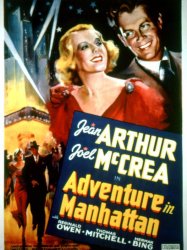
Adventure in Manhattan (1936)
, 1h13Directed by Edward Ludwig
Origin USA
Genres Drama, Comedy, Comedy thriller, Crime
Themes Films about writers, Films about journalists
Actors Jean Arthur, Joel McCrea, Reginald Owen, Thomas Mitchell, Victor Kilian, John Gallaudet
Roles Adaptation
Rating64%





George Melville (Joel McCrea) is a know-it-all crime reporter who tracks down a robber. Claire Peyton (Jean Arthur) is the actress who puts one over on him.
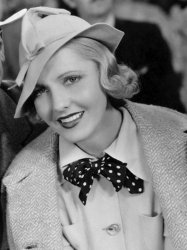
Party Wire (1935)
, 1h9Directed by Erle C. Kenton
Origin USA
Genres Drama, Comedy
Actors Jean Arthur, Victor Jory, Helen Lowell, Robert (Tex) Allen, Charley Grapewin, Clara Blandick
Rating66%





Matthew Putnam (Victor Jory) is summoned back to his small hometown of Rockridge by his aged, bedridden aunt Nettie (Helen Lowell) after seven years of enjoying himself in Europe, were he had been sent to study. She is tired and wants him to take charge of Putnam Dairies, the family business and the town's major employer. Every mother with a marriageable daughter is excited by the return of the wealthy young man, including Mathilda Sherman (Clara Blandick). However, Matthew shows no interest in Mathilda's daughter Irene (Geneva Mitchell).
 Connection
Connection
